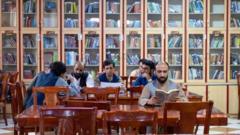Why Did the Taliban Ban Books by Women in Afghan Universities?

Published: 2025-09-19 03:55:35 | Category: technology
The Taliban government's recent decree banning books written by women from Afghanistan's university teaching system marks a significant regression in educational freedoms. This decision, part of a broader restriction on subjects deemed incompatible with Islamic law, has profound implications for women’s representation in academia and the overall educational landscape in Afghanistan.
Last updated: 29 October 2023 (BST)
Key Takeaways
- The Taliban has banned 140 books authored by women from the university curriculum.
- 18 subjects deemed "anti-Sharia" have been outlawed, significantly impacting women's studies.
- Restrictions on education for women have intensified since the Taliban's return to power.
- The ban includes titles that focus on gender development and sociology.
- Books by Iranian authors are also targeted in an effort to limit foreign influence.
The Context of the Ban
This latest ban is just one of many measures the Taliban has implemented since regaining control of Afghanistan in August 2021. Their regime has progressively restricted freedoms, particularly for women and girls, imposing severe limitations on education and professional opportunities. Women are currently barred from attending schools beyond the sixth grade, and midwifery courses, a vital pathway for many women, have also been shut down.
Specifics of the Decree
According to reports, the Taliban's Ministry of Higher Education issued a directive late in August 2023, outlining the removal of 680 books from university curricula. These books were classified as "of concern" due to their perceived conflict with Sharia law and Taliban policies. Among those banned are 140 authored by women, including educational texts such as "Safety in the Chemical Laboratory." This move raises serious questions about the future of academic discourse in Afghanistan, particularly in fields that focus on women's issues.
Impact on Women in Education
The ramifications of this ban are particularly severe for women. Subjects such as Gender and Development, The Role of Women in Communication, and Women's Sociology have been specifically targeted. This not only silences women's voices in academia but also deprives future generations of critical perspectives on gender equality and women’s rights.
Official Justifications and Responses
Officials from the Taliban government have stated that these measures are intended to uphold their interpretation of Afghan culture and Islamic law. Ziaur Rahman Aryubi, the deputy academic director of the Ministry of Higher Education, claimed that these decisions were made by a panel of religious scholars and experts. However, critics argue that this justification masks a systematic effort to suppress women's contributions to education and society.
Zakia Adeli, a former deputy minister of justice and one of the authors impacted by the ban, expressed her dismay at the developments, stating, "Considering what the Taliban have done over the past four years, it was not far-fetched to expect them to impose changes on the curriculum." Her remarks highlight the consistent pattern of misogyny that has characterised the Taliban's rule.
The Broader Educational Landscape
The ban on women-authored books is not an isolated incident; it reflects a broader trend of educational censorship that has emerged under Taliban rule. The prohibition of 18 subjects adds to a growing list of restrictions that have been imposed on academic freedom. A professor at Kabul University lamented that the removal of Iranian texts, which often serve as a bridge to global academic standards, creates a significant void in higher education. This sentiment underscores the challenges facing educators in adapting to these new constraints.
Concerns Over Academic Standards
With the removal of numerous educational resources, many professors are now left to create their own materials, often without the benefit of established academic guidelines. This raises important questions about the quality and relevance of the education being provided under such restrictive conditions. As one anonymous professor noted, the ability to prepare educational materials that meet global standards is increasingly compromised.
The Future of Women's Education in Afghanistan
The future of women's education in Afghanistan remains uncertain. The recent bans raise alarms about a possible regression to pre-2001 conditions, where women's rights were severely curtailed. With the Taliban's track record of restricting women's access to education, there is little confidence that these policies will change in the foreseeable future. The implications of these educational restrictions extend beyond academia, affecting the broader societal fabric of Afghanistan.
International Reaction and Implications
The international community has been largely critical of the Taliban's policies regarding women's rights and education. Various countries and organisations have condemned these measures, calling for an immediate reversal of restrictions that deny women access to education and professional opportunities. However, the Taliban has shown little inclination to heed these calls, often citing sovereignty and cultural integrity as reasons for their actions.
What Happens Next?
As the Taliban continues to solidify its grip on power, further restrictions on education and civil liberties could be anticipated. The international community may increase pressure for dialogue regarding women's rights, but the effectiveness of such measures remains to be seen. In a climate where education is becoming increasingly politicised, the future of academic freedom in Afghanistan hangs in the balance.
FAQs
What has the Taliban banned from universities in Afghanistan?
The Taliban has banned 680 books from university curricula, including 140 authored by women, and prohibited 18 subjects deemed incompatible with Islamic law.
Why are books by women being banned in Afghanistan?
The Taliban claims these books conflict with Sharia law and their interpretation of Afghan culture, aiming to suppress what they consider 'anti-Taliban' content.
How has the ban affected women's education?
The ban severely restricts access to subjects that promote women's studies and perspectives, further isolating women from educational opportunities and professional growth.
What subjects have been banned by the Taliban?
Among the 18 banned subjects, several focus specifically on women's issues, including Gender and Development and Women's Sociology.
What is the international response to the Taliban's educational policies?
The international community has largely condemned the Taliban's restrictions on women's education, calling for urgent action to reverse these bans and uphold women's rights.
As the situation develops, the future of education in Afghanistan remains precarious, particularly for women. The implications of these restrictions extend far beyond academia, affecting society as a whole. How will the world respond to these ongoing challenges? #EducationForAll #WomenInAcademia #TalibanPolicies



